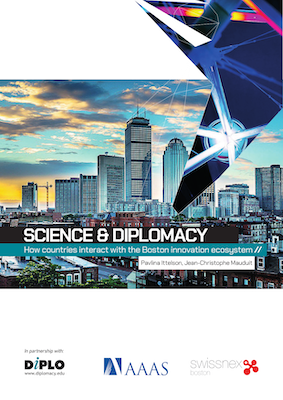Note: This article is a part of the publication ‘Science diplomacy capacity development: Reflections on Diplo’s 2021 course and the road ahead’
Scientific research has relied on a subscription based model for dissemination since the 17th century. Even after the digital revolution, this model (controlled by oligopoly giants) seems to continue to pose a barrier to sharing knowledge and the value of science as a common good. According to UNESCO, 70% of scientific publication was locked behind paywalls until the COVID-19 pandemic (Burke 2021).
Open Science (OS) is key for innovation, efficiency, and transparency, and it establishes lines of communication and social engagement. It further makes knowledge accessible to diverse groups outside academia (Besançon 2021). Communication and trust are essential for Science Diplomacy (SD), whereas paywalls do the opposite. My workspace defends the need for all science to be open, as a basic human right (GESDA 2021), and fosters SD.
COVID-19 clearly revealed the importance of OS to combat the virus and its aftereffects. Open circulation of knowledge was a key reason for the “fast forward” to COVID-19 pandemic recovery. We brought in various stakeholders including scientists, funders, and policymakers, and created an open platform to share content freely (Coronavirus Hub (2020)). According to Scopus (2020), Cardiovascular disease has been another pandemic in itself, affecting double the number of humans and resulting in four times the number of deaths (Ritchie and Roser 2019) as COVID-19. But only 26% of Cardiovascular research is freely accessible without paywalls or Open Access (OA).
OA is still neglected in the area of climate crisis and mitigation. According to Tai and Robinson (2018), an only 4% share of climate research was OA in 2007, which increased to 25% in 2018. Thanks to the pandemic, the importance of OA has resonated with international agencies (UNESCO 2020). Public participation and policy engagement is the need of the hour to face the climate crisis, and science communication needs to move to rocket speed, in the same way that mitigated the pandemic. Even though the oligopoly subscription market has not been opening its gates, agencies are making efforts to make climate research open (Creative Commons 2021).
My role involves amplifying the voices of these key stakeholders in the direction of OS (Policy Labs 2022), supporting consultations regarding national OA policies with evidence based research to drive policy decisions, like the UNESCO recommendation (Frontiers 2021), and working closely with young researchers in driving change, as they are the missing link in the Science and Policy puzzle (Morgan 2022).
These coordinated efforts have made the oligopoly subscription giants engage with OS, reluctantly, with complicated transformative agreements which enable double dipping of funds and extending paywalls to beyond 2024, the deadline set by Plan S (Widmark 2021).
The roots of the issue lie in the long-standing research assessment system which depends on metric-based evaluations that do not really indicate research quality. This is a result of miscommunication wherein science and policy speak different languages, and there is thus a great need for mutual alignment. DORA, EUA, SPARC have expressed the need to change this set up with their call for action to policymakers/governments (Saenen 2021). Similar collaborative efforts through Science Diplomacy are being designed at the funding and government levels (Zubașcu 2022).
My role as a ‘boundary spanner’ involves bridging the different stakeholders for OS to become the norm, and this indeed involves a clear focus on Science in Diplomacy. Busting OA myths and educating policymakers on the benefits and significance of OA is important. This surely involves a collaborative effort between the public, private and governmental sectors.








